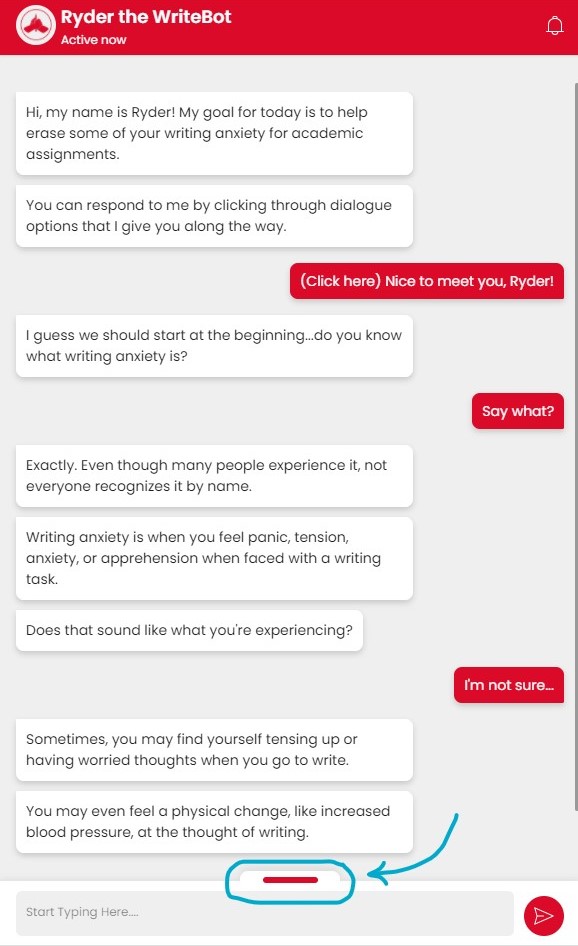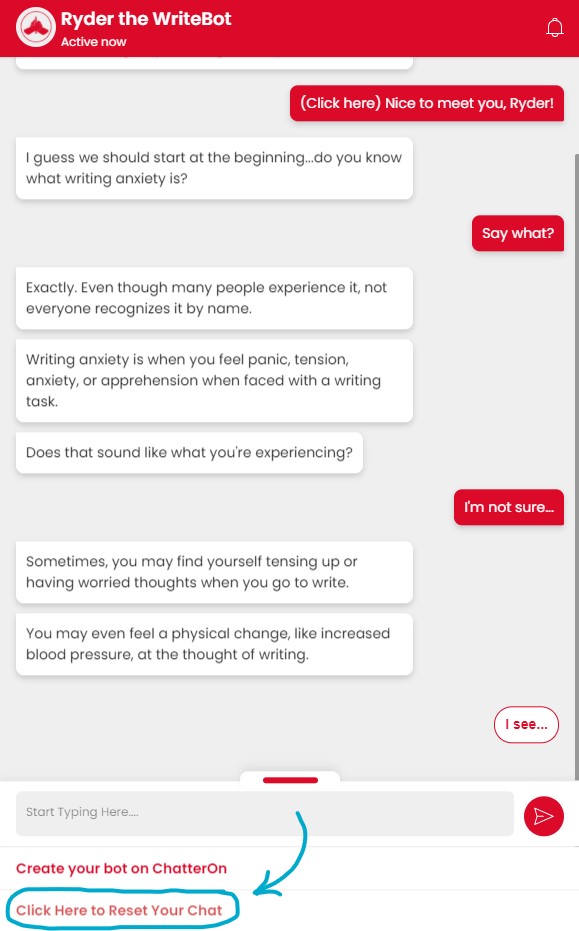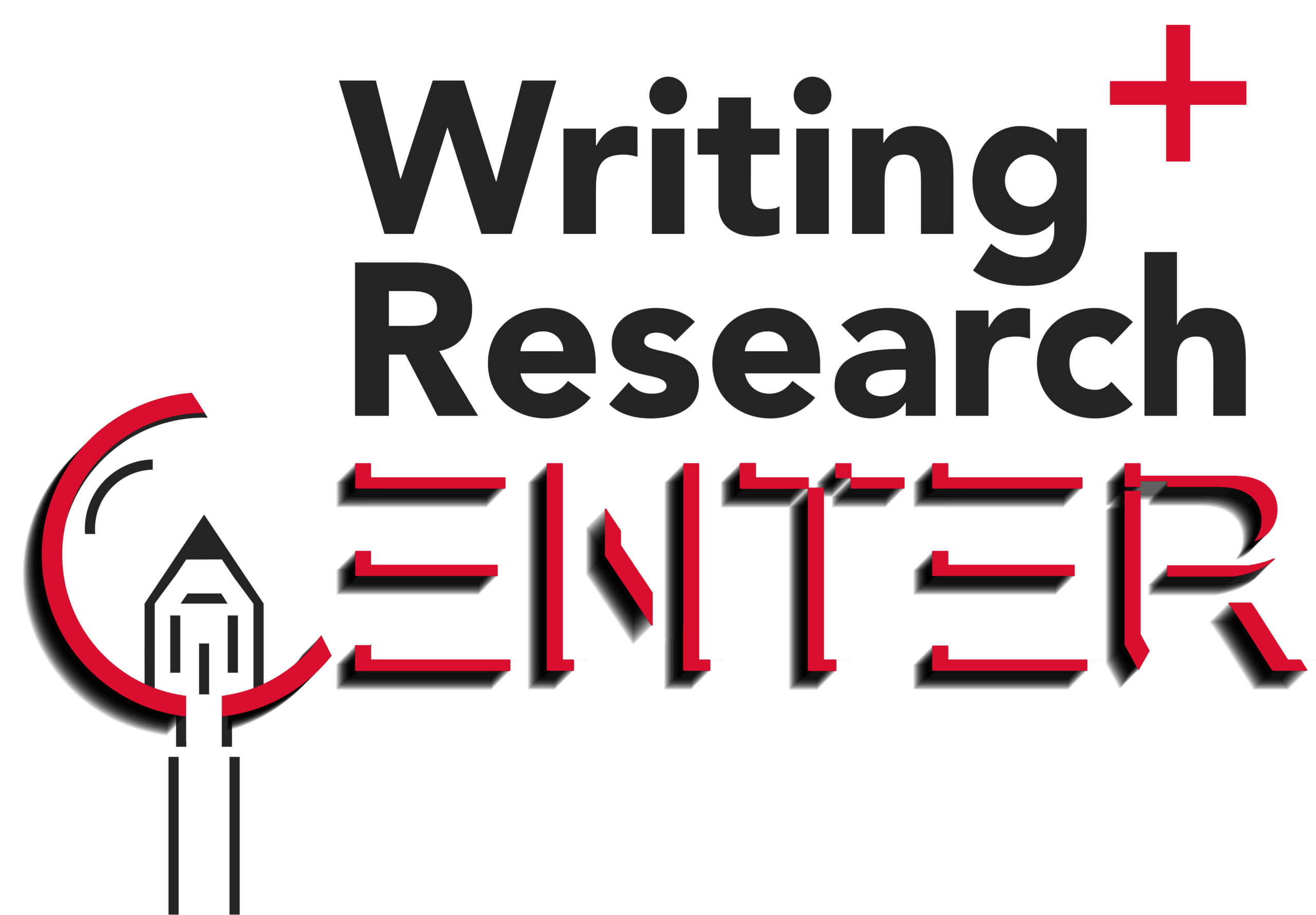Writing Anxiety Resources
Lots of people experience writing anxiety, and it can prevent us from engaging in writing. Our tutor team has compiled some strategies and techniques for understanding and overcoming writing anxiety. Our tutors are also a helpful resource if you are experiencing writing anxiety, and they are more than happy to talk with you about strategies for gaining confidence as a writer.
Meet Ryder, the Writing Anxiety Chatbot!
Chat with us!
Ryder was designed to help you understand and work through anxiety you may be feeling due to writing. Chatbot programs like Ryder simulate a conversation in real-time to offer immediate solutions. Help is only one click away!
If you need to reset the chat in Ryder, follow these steps:

Step 1:
Click on the red bar below your text conversation.

Step 2:
Clear the chat by selecting “Click Here to Reset Your Chat.”
What is Writing Anxiety?
When approaching a writing task, many students may feel a sense of panic, tension, anxiety, or apprehension. These tumultuous feelings can and do occur no matter what kind of writer you are and no matter one’s skill level. Basically, these feelings are a natural reaction to a potentially stressful situation, and you are not alone in feeling them!
Why Does Writing Anxiety Occur?
Students can experience writing anxiety either from a particular assignment, the perceived expectations of a professor, or their own perceptions of their writing abilities. Another common reason for writing anxiety is that students view writing as a bundle of concepts that are too abstract to clearly think through. This causes them to lose sight of the concrete steps one can take to write a paper.
Strategies to Overcome Writing Anxiety
Strategy #1: Break the task into smaller, manageable steps.
A good place to start if you’re feeling lost is always to carefully review the directions, highlight key terms, and ask your professor for clarifications; they are there to help you!
Once you have a grasp on the directions and expectations, it is time to begin brainstorming ideas. If you work better without structure, free-write your thoughts on the given prompt or directions until you find what interests you about the topic. If structure is more your style, coming up with a main idea first and brainstorming from there may work better.
From here, you will have a rough thesis that will change as you write or outline your paper. Then, you can free write. Highlight and add comments to places in your writing that need more support, stronger arguments, and sources. This last part can be repeated until the final draft is done.
If you work better with physical materials, print out your sources, the instructions, your paper, your outline, and/or your brainstorm. Highlight, underline, mark up, cut up and rearrange; do what you need to do to organize and better understand the material.
Strategy #2: Step back to gain perspective on the situation.
Remind yourself: you are not a bad writer, just an anxious one. You have strengths in writing that others don’t; remind yourself of those strengths. You are a student of writing, not everything you make will be perfect, as you are in the process of learning! Writing is a skill that you are developing. Self-talk and reflection is important for increasing your confidence and creating realistic expectations.
Strategy #3: Don’t isolate; seek out help from one of our consultants.
Struggling in silence doesn’t help your emotional well-being, your learning, or your writing. Sharing your experiences and struggles with a classmate, professor, or a writing consultant can be a relief and can open up pathways for you to get the help you need. The Writing Center is a safe space for writers at all levels of learning and ability. As a free resource, you don’t have to go through the writing process alone and suffer in your anxiety. By making recurring appointments, you will learn tools to use in future writing projects so you feel more prepared as a writer. We also highlight your strengths to improve your writing confidence, decrease your anxiety, and help you to become a stronger writer.
Additional Resources
WOU Free Tutoring
There are free tutoring services for just about any content area on campus, whether you need help with writing, math, or another one of your classes.
Hamersly Library
If you are struggling to find a resource or need help getting started with your research, WOU’s library is a wonderful resource.
Office of Disability Services
If you have a disability and need accommodation, reach out to ODS to learn how you can get support.
Student Health & Counseling Center
Health in all areas is important, and the health and counseling center is a wonderful service for students here on campus.
Mental Health Resources
Whether you need mental health support now or want to build better mental health for when times get tough, visit this resourceful website for excellent information and support.


